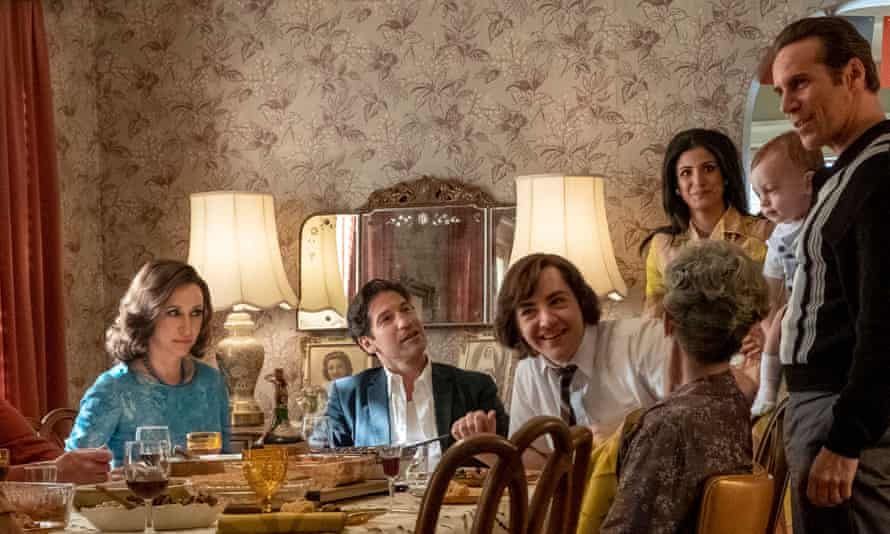Read also:
How to Watch FX Live Without CableHow To Watch AMC Without CableHow to Watch ABC Without CableHow to Watch Paramount Network Without CableThe prequel to the landmark HBO series fleshes out the capos who came before Tony Soprano.
When Anthony “Tony” Soprano first appears in Alan Taylor’s The Many Saints of Newark, he’s just a kid, hanging on the shoulder of his Uncle Richard “Dickie” Moltisanti (Alessandro Nivola). Much like the show it precedes, Taylor’s crime drama focuses on family, a group of related and unrelated men and women influencing and subsequently controlling various parts of New Jersey. Billed as a Tony Soprano origin story, a prequel that wasn’t needed but wanted, the film never feels inherently necessary or emotional. It coasts upon characters it has already set up, actors with pedigree playing said characters, and the understanding that this David Chase-created world is still connected and worth our time.
Ray Liotta, depicting twin brothers Aldo “Hollywood Dick” Moltisanti and Sal “Sally” Moltisanti, says it plainly when describing what gets these men in trouble, “It’s the wanting.” Narrated by Christopher Moltisanti (Michael Imperioli), Dickie’s son and a major player in the HBO series, the drama is about the wants of several men. It’s not an origin story, but rather a story about the continuous cycle of crime and toxic masculinity. It’s about men who will forever be living for excess, those who end up sitting alone at kitchen tables eating food made by emotionally and physically hurt women they only appear to love. They idolize their fathers, their uncles, their bosses, until they don’t, until they want more, until they become a version of what they despise. Usually, this reverence ends with generational abuse, violence, and death for them and those around them, which Taylor has no problem showing in spades.
Following Dickie’s personal and professional life as he interacts with DiMeo business dealings, the film attempts to cover racial and political ground, setting some of these events during the 1967 Newark riots and the introduction of Harold McBrayer (Leslie Odom Jr.) as a formidable foe leading his own tenuous revolution against the Italian-American mob. Writers David Chase and Lawrence Konner never give enough depth to these storylines, though, having them rest in the background until it serves the progression of a DiMeo character.

It’s impossible to separate Taylor’s film with Chase’s series, with comparisons likely coming early and often. But The Many Saints of Newark acts as a down-the-line family crime movie, a story that’s been seen countless times, made by countless directors. It functions well in this capacity, often escaping, not transcending, the shadow of its six-season predecessor. Still, many will wish that this film was just another television series, because 120 minutes never feels like enough time with these characters, especially those that fans had heard so much about 15 years ago. Fan service runs throughout the film, with the initial voiceover and third act sequences answering the most outright questions that have brewed since that fate-filled cut to black.
Though the casting of Michael Gandolfini, James Gandolfini’s son, grabbed most headlines with his role as a young Tony Soprano, he has little to do as a high school jock hoping to become closer to his Uncle Dickie. Nivola grabs up any screen-time he can, balancing the same awfulness with charisma that mobsters like Tony Soprano do with ease. He jumps from his family to his mistress to the family business and back again nearly each day. He feels all-powerful and untouchable, which is the first step towards a sure-fire destruction. Nivola brings an undeniable charm to each scene. Liotta and Nivola become the clear-cut standouts, overwhelmingly due to their extended scenes together.
Many will wish that this film was just another television series, because 120 minutes never feels like enough time with these characters.
The rest of the cast, which includes the likes of Corey Stoll, Jon Bernthal, John Magaro, and Billy Magnussen, all fine actors in their own right, exist on the sidelines, serving as means to advance the plot of Dickie Moltisanti. They exist as punchlines, enforcers, or unfailing supporters. Leslie Odom Jr. and Vera Farmiga, who portrays a much-younger Livia Soprano, get the short end of the stick; they’re dynamic actors reduced to reactive scenes and momentary brightness.
For fans of The Sopranos, Taylor’s prequel should be satisfying enough. It won’t bring clarity to all the questions or relive the most interesting flashbacks (or early mentions) from the series, but it will be a serviceable way to remember the series. It acts as a reminder of The Sopranos’ brilliance, knowing that the film could never have the same impact. It’s an addition that will likely be forgotten, even as the TV series continues to ebb and flow into the cultural conscience. But, for fans of crime dramas and melodramatic families, The Many Saints of Newark is a messy, stuffed thrill, an attention-grabber with a story baked in tradition, patterns, and the idea that all good, and bad, things must come to an end.
The Many Saints of Newark is now in theaters and available for a limited time on HBO Max.